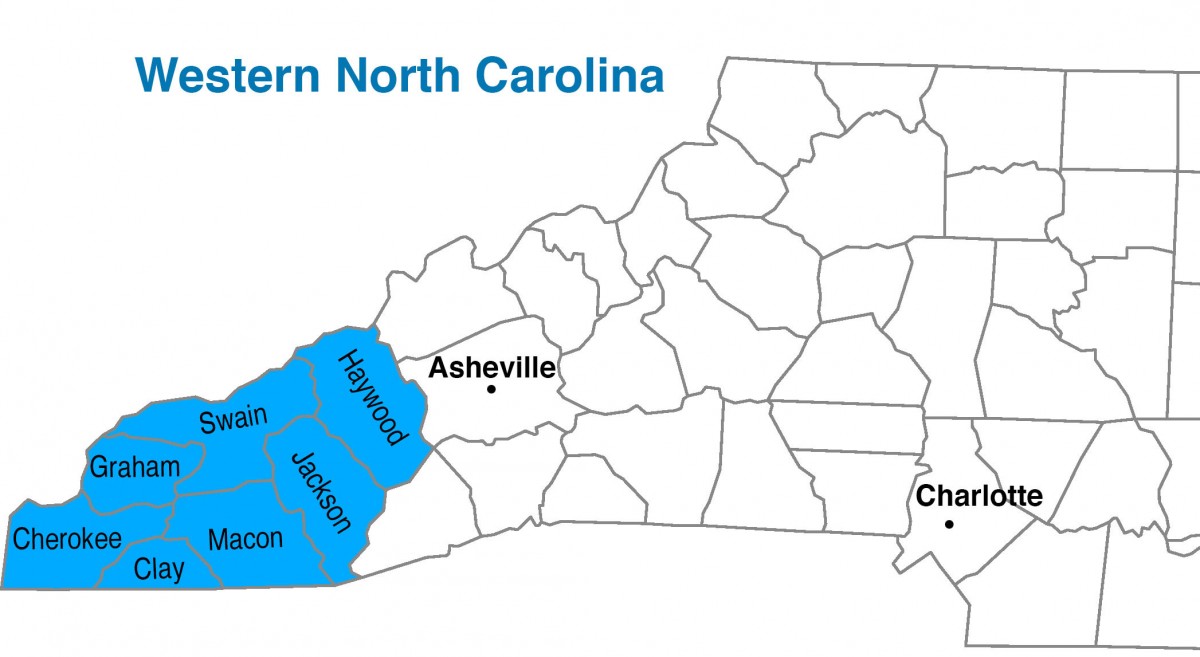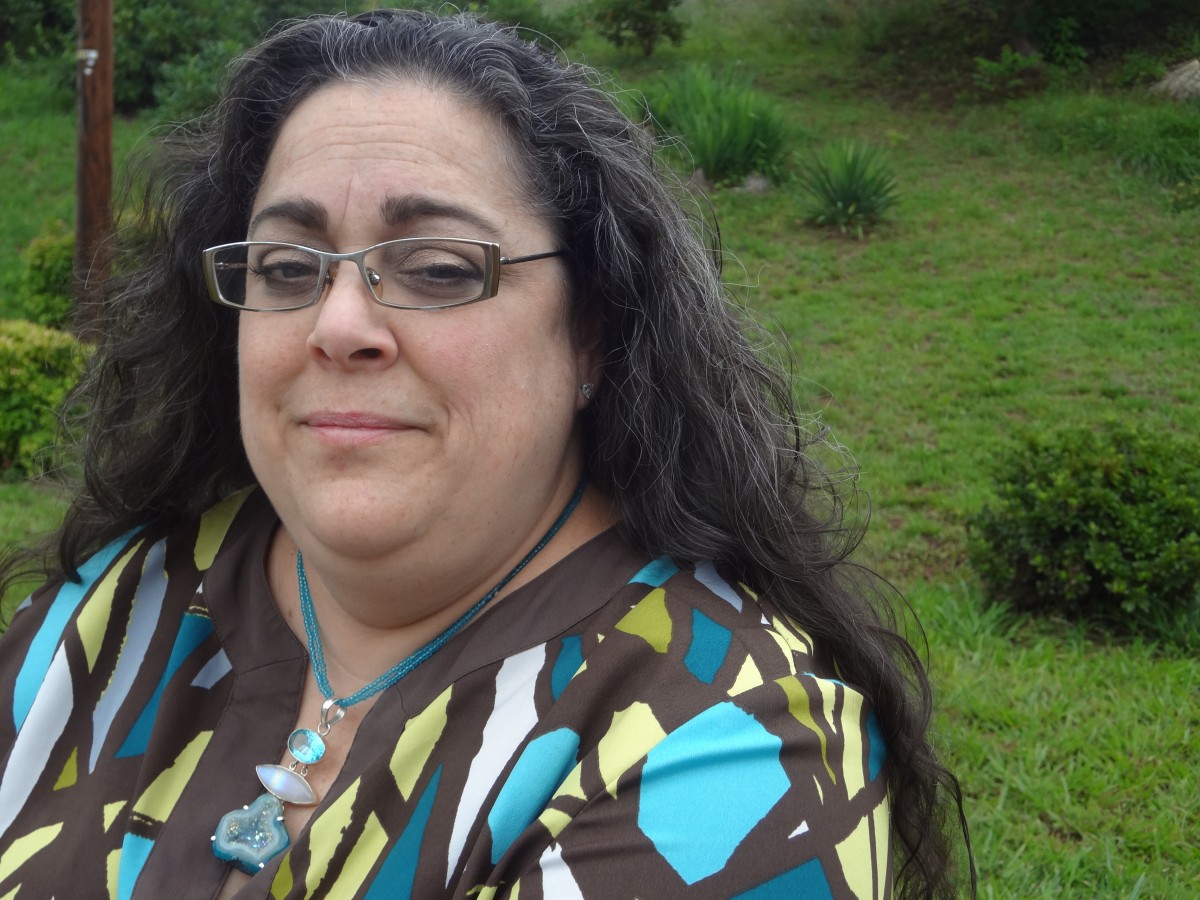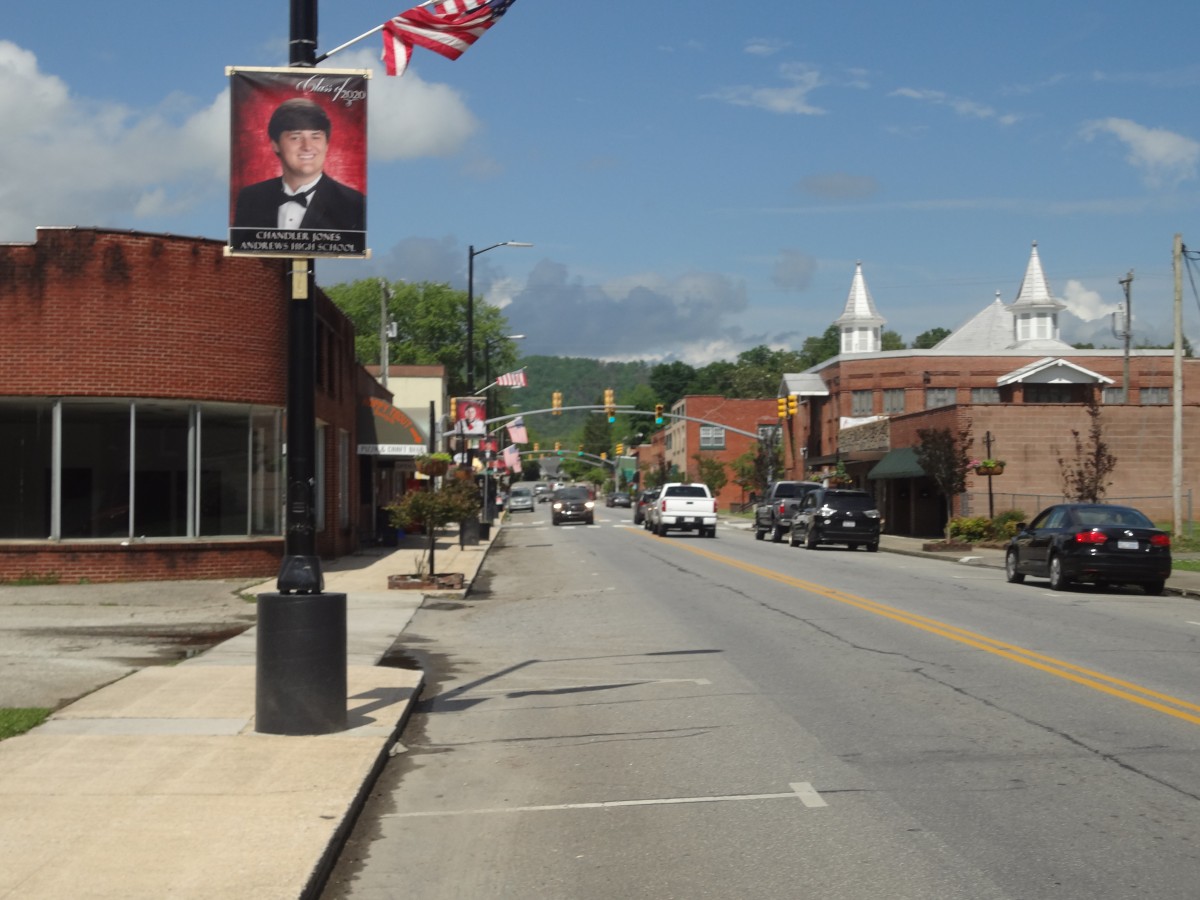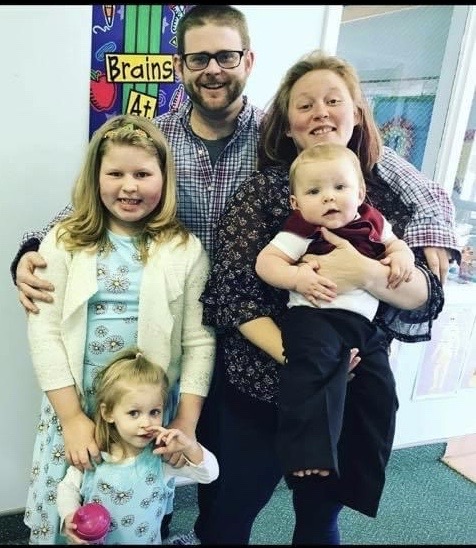In the rural westernmost counties of North Carolina, providing services to neighbors in the best of times requires resourcefulness – doubly so in a crisis.
Getting from point A to point B on these mountain two-lanes often entails circumventing point E. It’s 35 miles from Franklin, county seat of Macon County, to the town of Nantahala. On a clear spring day, the drive takes about an hour. In inclement winter weather, or on a summer day teeming with tourists, best to stay home, assuming you have one.
As founder and CEO of Full Circle Recovery Center in Franklin, Stephanie Almeida offers counsel to those recovering from drug misuse and abuse. As executive director of Smoky Mountain Harm Reduction, she provides life-saving services. And as a resident of Macon County, she shares whatever else is needed to whomever among her neighbors needs it.
In these days of COVID-19, Almeida is offering food, medical supplies, hand sanitizer, tents and more to those in her rural community whose lives got a whole lot tougher with the outbreak — those for whom sheltering options are limited, food sources are scarce and maintaining proper hygiene is a challenge.
Statistics show that rural Americans, on average, are older, have a lower income and are less healthy than urban residents. Each of those puts them at higher risk of serious illness or death from COVID-19.

In five of the seven westernmost North Carolina counties, 24 percent or more of residents are 65 or older. The state average is 16.3 percent. In six of those seven counties, the poverty rate is also above the state average.
As most everywhere, COVID-19’s economic impact on this pocket of Appalachia is and will continue to be immense. And though the numbers of cases and deaths in the region remain low, health care officials fear that the rate in rural America will continue to climb. National and local data attest to this.
Meanwhile, people on the ground in these communities – like Almeida – are responding to immediate needs and preparing for what may come with a broad continuum of services: coordinated communications, steady outreach and the provisioning of necessities.
Lifelines
The community-based nonprofit Mountain Projects was founded to provide that continuum. It serves Haywood and Jackson counties, offering food, transportation and housing services; a substance-misuse prevention and treatment program; and much more.
Patsy Davis, Mountain Projects’ executive director, says that given heightened food insecurity and sheltering-in-place guidelines, her staff is now making deliveries to those in need. That’s a lifeline for Arminda Schaffer.
Schaffer, 59, lives in the town of Canton in Haywood County. She gets around in a wheelchair.
“If not for them bringing me food,” she says, “I would have no food.”
Mountain Projects also gets her to her doctor’s appointments. That assistance, she says, is “a blessing from God.”
Davis says her primary objective is to ensure that “people don’t drop off the cliff” – that whenever a person enters a human-services agency, “you can hand them off; that there’s that continuum.”

Since the shutdown, she says, Mountain Projects – which is headquartered in Waynesville, the Haywood County seat – has primarily been providing emergency services, meeting needs as they arise. “You change gears as needed; that’s what we’ve done over the last months.”
Among those Stephanie Almeida has been assisting from her office in Franklin, 40 miles to the southwest of Waynesville, are the working poor, including a middle-aged couple who have been living in their car. Prior to the outbreak, they’d put aside the money for a deposit and first month’s rent. But now landlords aren’t showing apartments.
Each day, she says, the man and woman go to work, then return to their car. “And there are so many people that this is happening to.”
Almeida gathers supplies from wherever she can. She has a big umbrella she places in the entryway to her office. “People will come up to the door and say, ‘Hey, Stephanie, you got any food?’ And then I just hand it across to them, along with toiletries or whatever else they need.”
“This is wearing everybody down,” she says. “My colleagues that work in substance use and mental health are exhausted.”
The Essentials
Years ago, while living on the West Coast, Viy Langager stood on the railroad tracks for 18 months waiting for a dead man. Her boyfriend had been hit by a train, and she would return to the tracks, waiting for either his return or a train to end her life.
Her friends, who likewise lived on the street, would coax her away from the tracks. They talked her through the voices, the anxiety and fear. They “helped me breathe through it,” she says. They kept her clothed and fed. They helped her stabilize and find housing.

A year and a half ago, Langager helped move her mother to Western North Carolina and decided to stay. She lives in the tiny town of Marble, in Cherokee County, and works as a peer-support specialist, helping people along the path to recovery. She’s also now launching an outreach initiative for those who are unsheltered and grapple with behavioral-health issues.
“We had a really bad storm several weeks ago,” she says, “and that’s kind of what kicked me into gear.” With sheltering options much more limited now, “It broke my freaking heart.”
Langager has begun collecting food, clothing, sleeping bags, tents, body wash, dry shampoo (clean water sources are scarce). A community member made a donation toward the rental of a storage unit. Langager hopes to also help connect people to medical and behavioral-health resources.
But the basic necessities must be prioritized: “I can’t show somebody a path to recover if they’re sitting there and they haven’t eaten in three days.”
“What I’m seeing around here is just a lot of desperate people,” Langager says. “It’s really sad.”
Sewing Circles Step in
Early into the outbreak, Jackson County set up a call center in its emergency operations center, 631-HELP, manned by public-health staff. “I think that was helpful in our community to clear up some of the confusion and alleviate some of the fear,” says the county’s health director, Shelley Carraway.
Community organizations mobilized. Sewing circles crafted masks; small manufacturing businesses called to ask what they could provide. A local pastor was named county food coordinator.
Housing Equity Resources & Education, or HERE, serves Jackson County’s unsheltered residents. The county has no year-round homeless shelter. Its cold-weather sheltering – provided in motels in the town of Sylva – was scheduled to end by the first of April.
“On March 25, we started bringing in new people for what we call our COVID shelter,” says HERE’s program director, Robert Cochran.
The most rooms HERE had ever had available during the winter months was 28. With the outbreak of the virus, they’ve secured 31 rooms and as of the end of May had housed 171 people. Many of those had been couch surfing and, given the threat of contagion, were told by their hosts to make other arrangements.
Cochran says the immediate impact of the virus was the inability of those he serves to socially distance themselves and to shelter in place. “When you’re homeless,” he says, “you go wherever someone will allow you to perch for the night.”
His longer-term concern is that with a down economy there’s going to be a lot more folks looking for little available affordable housing.
Overwhelming
Traffic has picked up in Sylva and Waynesville, and Patsy Davis worries that people have begun to let their guards down.
She also worries about tourists now returning, eager for respite in the beauty of the Great Smoky Mountains National Park. She worries about the potential spread of contagion that may arise with this influx. She also acknowledges how critical tourism in the summer and fall is to the region’s economy.
Carraway notes that her county, Jackson, has a substantial second-home population. Many of them began arriving early into the outbreak.
Her message to them has been: “If you’re coming to stay at your property – and it’s your perfect right to do so – we need you to bring all your groceries with you, and for 14 days you just need to self-quarantine…We love you and you’re part of our community, but you know what our capacity is here. We’re a small, rural, geographically challenging Western North Carolina county.”
The hospital systems in the region, Carraway fears, could be easily overwhelmed.
Davis believes that, for the most part, people in her community are stable right now – they have the shelter, the food, the help they need – but she’s looking ahead to the fall and winter months, when the moratoriums on utility disconnections expire and evictions return.
“Winter is so hard for so many people,” Davis says. “Our elderly, our disabled, our lower-wage earners struggle so hard in the winter. And so my focus is on what we’re going to be doing in November and December when I feel like we’re going to see the worst of this.”

Then, as now, she and her colleagues throughout Western North Carolina will focus on meeting their neighbors’ most immediate needs.
Rebecca Ivey, her husband, Matthew, and their three children live in Waynesville. Matthew is a chef; Rebecca worked at a bed and breakfast. They both lost their jobs in March. They’ve received assistance from Head Start, which operates under the Mountain Projects umbrella.
“They’ve been great to us,” Rebecca says. “I went to pick up my daughter’s clothes a week or so ago and they just handed me a big bag of chicken.”
The Iveys had long been considering launching a food truck and have decided now is the right time. “This whole situation has basically showed us that things are changing. Fine dining might be a little bit of a thing of the past for a while, and it’s time to just take off on our own.”
“It’s a way to be positive,” she says, “making lemonade out of lemons.”
Davis was among those who cut up the chicken the Iveys were given. She and members of her Head Start staff have been loading drumsticks into Ziploc bags and delivering them throughout their two counties – another link in the continuum.
“In community action, “ Davis attests, “you take the action that’s needed at the time.”



